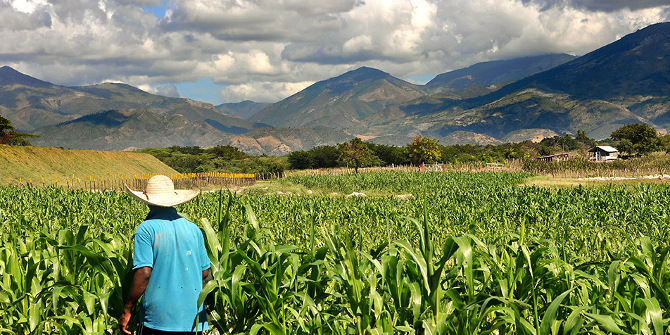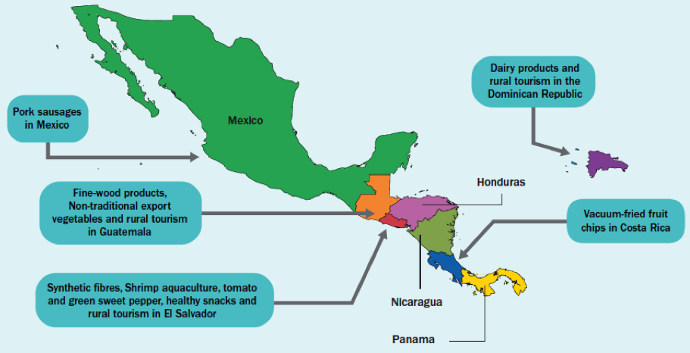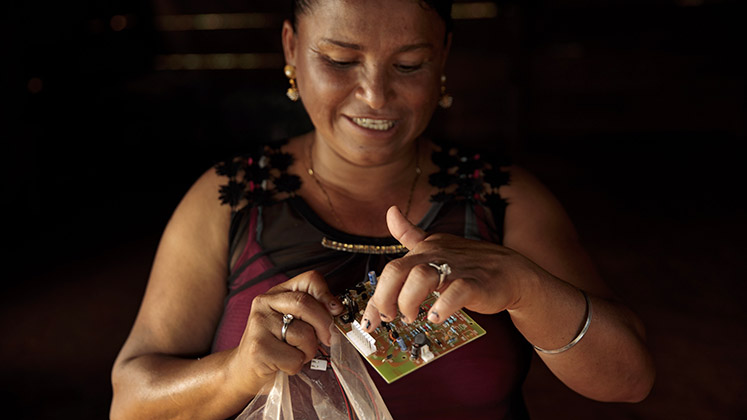 Global actors can interact along local value chains through international trade and foreign direct investment flows. By leveraging the value-chain approach for rural areas, recent policies have led to economic and social upgrading in Latin America, writes Ramón Padilla Pérez (UN Economic Commission for Latin America and the Caribbean).
Global actors can interact along local value chains through international trade and foreign direct investment flows. By leveraging the value-chain approach for rural areas, recent policies have led to economic and social upgrading in Latin America, writes Ramón Padilla Pérez (UN Economic Commission for Latin America and the Caribbean).
Latin American countries in general have seen a revival of industrial policies in recent years, amid a growing consensus on their importance for long-term economic development. Industrial policies are particularly important for achieving a structural change characterised by increasing innovation and inclusive economic growth.
Such policies have been heavily focused on the manufacturing sector and, more recently, on high value-added services. Recent technical assistance delivered by the United Nations Economic Commission for Latin America and the Caribbean (ECLAC) to national governments shows the case for industrial policies focused on rural areas.

Even though the percentage of the population living in rural areas is declining, these areas still accounted for 20 per cent of Latin America’s population in 2015. By the same token, the rural economically active population (EAP) represented 19 per cent of total EAP.
Poverty levels are significantly higher in rural than in urban areas, a phenomenon that is closely linked to other gaps (for example, in education, infrastructure and access to services). In Latin America, 46 per cent of the rural population lives in poverty, while 24 per cent of the urban population does.
Innovative policies, which recognise that rural is not synonymous with primitive or backward changes and that profound transformations have been taking place in the rural paradigm, are needed to bring about economic and social development of rural areas.
Therefore, a new approach to address productive development in rural areas is needed. ECLAC has developed a new approach named “rural industrial policy”, which is understood as the implementation by the state of measures that are aimed to strengthen production activities located in rural areas, with a view to bringing about structural change via manufacturing and services activities and the integration and complementarity of more dynamic, knowledge-intensive activities, markets, and sectors.
Strengthening rural value chains
The value chains approach has proved to be a very useful tool to implement industrial and productive development plans. A value-chain approach serves to analyse bottlenecks and consider strategies at the stakeholder level in each link of the chain —a microeconomic focus— in order to boost productivity and value added. The microeconomic and systemic approach enables the preparation of specific action strategies in different spheres, as well as the integration of the various industrial policy instruments available.
Value-chain analysis has been widely used to study global networks. Although rural chains are commonly local, their direct and indirect interactions with global actors, through both international trade and foreign direct investment flows, are crucial. Each link of the chain has actual and potential connections to foreign actors through technology transfer, specialised inputs, customer service, and final goods.
To strengthen value chains, ECLAC has developed a nine-step participatory methodology:

Since 2013, ECLAC Mexico has provided technical assistance to diverse governments to strengthen rural value chains in the following areas:
- Agriculture, silviculture, and fisheries: export vegetables, tomato and green sweet pepper, fine-wood products, and shrimp farming.
- Manufacturing: nutritional snacks (processed foods), pork sausages and other cured pork products, dairy products.
- Services: rural tourism.

The main outcomes of the process can be summarised in three categories:
- Design of participatory strategies for chain strengthening
Strategy design is based on a diagnostic of the value chain’s situation (with a focus on bottlenecks), and in the identification of international good practices. With those concerns in mind, a document is prepared containing three main sections: diagnostic, good practices and strategies. These components are validated by the public bodies acting as counterparts, as well as by members of the chains through the dialogue tables and direct observations regarding the documents. National governments take charge of implementing the strategies, using either their own funds or additional assistance from international financial agencies. The implementation of the strategies is aimed to achieve both economic and social upgrading in the value chain. The former is understood as a process or transition toward activities of greater technological complexity, which implies an enhancement of the products or services offered by the chain, or a more efficient approach to producing goods or supplying services. Social upgrading, in turn, is defined as processes for improving workers’ rights and benefits by enhancing the quality conditions of their employment and immediate surroundings. - Appropriation and methodological replicabilities
Public bodies in Latin America and the Caribbean have adopted the ECLAC methodology, given that ECLAC’s accompaniment strategy includes knowledge transfer and capability creation among public officials. - Improve public-private and private-public dialogue
The methodology is focused on enriching public-private dialogue as a key element in the development of an industrial policy. When the public and private sectors work together, they can enhance their ability to unlock the bottlenecks that act as an obstacle to economic and social upgrading.
To conclude, while recognising the enormous challenges that rural areas face in Latin America and the Caribbean, which must be addressed with a comprehensive set of policies, the value-chain approach has proved to be a very useful tool to design and implement targeted strategies, leading to both economic and social upgrading in rural areas.
Notes:
• The views expressed here are of the authors and do not reflect the position of the Centre or of the LSE
• This post draws on the author’s edited book Rural industrial policy and strengthening value chains (ECLAC, 2017)
• This article was originally published by the LSE GILD blog
• Please read our Comments Policy before commenting





